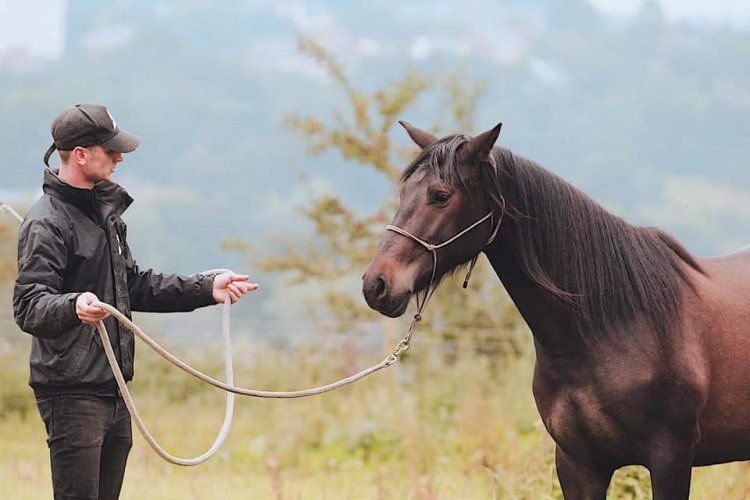in basket
TOP OFFER - SUMMER20 - 20% OFF* and 4 FREE seasonal products! *Excludes smaller pack sizes, treats, feed and mash.
Horse behaviour & learning: Part 2

As I talked about in our previous blog article, behaviour is the product of a complex interaction of an animal’s genes and its environment. Genetics predispose the horse to behave in a certain manner, but the actual behaviour is in fact the result of a combination of genetics and learned behaviour in the environment. When training our horses on the ground and when ridden, it is vital that we are rewarding the behaviour that we want to reinforce. However, many unwanted behaviours in horses can occur as a result of inconsistent cues given to the horse, resulting in the horse becoming more and more confused about what is being asked of them. This is especially true when a horse is trained by more than one person: for example, more than one handler and/or rider.
Image credit: Model Freddy Steele
Horses are also often given inappropriate signals, such as delayed, inconsistent or meaningless reinforcement that result in behavioural changes. One example of this is asking the horse to move forward from the leg, but not releasing the pressure of your leg once the horse responds – the timing of this is essential, you may recall from my previous article that timing of reinforcement is critical. Other unwanted behaviours can result if the owner/trainer makes the mistake of inadvertently reinforcing undesired behaviour because of a lack of understanding of how horses learn; for example, giving your horse attention when he/she bangs their door.
To begin to address the unwanted behaviour it is important to understand why these behaviours may have arisen and then implement a plan to modify that behaviour. In addition, in order to prevent, reduce or eliminate such undesirable behaviours it is essential to employ training techniques that use the principles of learning theory to avoid the application of conflicting signals.
Equine behaviour & health
Another important factor is to eliminate any possible health issues that may be contributing to the unwanted behaviour; for example, gastrointestinal issues (such as gastric ulcers), orthopaedic pain (such as a sore back or lameness) and dental issues are just some of the factors that could impact on your horse’s behaviour. Therefore, it is important to consult your veterinarian if you have concerns that there may be a medical issue that has led to a change in your horse’s behaviour. It is also important to note that horses have a very good memory for pain and, for example, if your horse was experiencing back pain due to an ill-fitting saddle, even after the saddle issues have been resolved it is possible that your horse will still associate the saddle with pain. Therefore, it is important to remember that behavioural changes take time and are impacted by many factors. Also, never forget that the most important issue to consider when handling or riding your horse, is your safety and the safety of others.
Equine behaviour & diet
I have talked a lot about the impact that diet can have on your horse’s behaviour. We know from research studies that horses fed starch are more likely to have higher heart rates, be more reactive (not the good kind of reactive, but “spooky”), less likely to investigate new objects, less predictable in their behaviour and consequently more difficult to handle compared to horse fed a 100 percent fibre diet. It was initially thought that this was due to digestive discomfort, but whilst this may still have some impact, there is a growing body of evidence that a horse’s gut microbes play a significant role in their behaviour.
In humans and other species, there has been a large number of studies that have identified a strong link between gut microbiota and an individual’s health and wellbeing, and from that there has been a significant interest in the relationship between the gut and the brain. The influence of the microbes in the gut is thought to impact on the central nervous system and hence influence behaviour.
The gut-brain axis
The communication system between the gut and the brain is two-way and has several routes (or pathways), some of which involve direct communication via the nervous system and others that involve indirect communication through the neuroendocrine and immune systems. All of these pathways by which the gut and brain communicate are thought to work together. Whilst these pathways are not fully understood as yet, it is thought that one of the pathways is via the vagus nerves. The vagus nerve is a major nerve of the nervous system that provides a direct communication link between the gut and the brain. Another aspect of this is the production of hormones in the gut that communicate with the brain as well as stimulating and supressing the release of other hormones. There are several hormones produced by gut microbes that act as neurotransmitters (chemical messengers), including serotonin and dopamine. These neurotransmitters are involved in several physiological functions, including locomotion, gut motility (movement), as well as having a significant role in the behavioural responses of an individual.
Stress & behaviour in horses
The neuroendocrine system in the horse controls various body processes in response to stress, which is known as the hypothalamic-pituitary-adrenal (HPA) axis. The HPA axis is a major physiological stress system (also referred to as the stress-axis) that produces cortisol. It is possible that the change in gut microbes as a result of diet may trigger neuroendocrine changes that affected the behaviour of the horses. Environmental factors, such as a change in environment, a frightening noise or object, travelling, and competing are all factors that can induce a stress response in your horse. When horses as stressed, they are less able to concentrate, less likely to pay attention the commands of the handler/trainer and generally more difficult to handle/ride.
Conclusion
If we understand and appreciate the natural behaviour of the horse and also how horses learn, then we can implement training programmes that are successful and develop our horses in a way that reduces stress and promotes calm and consistent behaviour when being handled and ridden. We can also take measures to maintain gut health at times when stress may impact that; for example, feeding a probiotic supplement containing yeast. Feeding a calmer that may help alleviate the behavioural consequences of stress may also be beneficial for those times where your horse is experiencing stress, which is impacting on his/her behaviour.
Article written for Premier Performance by Professor Jo-Anne Murray.
Read Part One of our Horse behaviour and learning article series here








